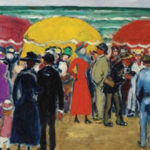We run our website the way we wished the whole internet worked: we provide high quality original content with no ads. We are funded solely by your direct support. Please consider supporting this project.
Is There Room for Doubt in Faith?
Many Christians today assume that faith is the antithesis of doubt. In this view, a person’s faith is thought to be strong to the extent that they don’t question their beliefs or struggle with God in whom they believe. As widespread as this view is, I believe it is unbiblical and profoundly unhelpful.
My experience as a pastor and professor has taught me that when people assume faith and doubt are incompatible, they invariably try to avoid the latter. Indeed, when faith is equated with psychological certainty, the experience of cognitive dissonance—an experience that is the precondition for almost all learning—easily gets interpreted as something that is evil and therefore is to be avoided at all costs. For obvious reasons, those who are afflicted with this unfortunate model of faith understandably find it hard, if not impossible, to honestly acknowledge, let alone feel the full force of, the merits of perspectives that challenge their belief system. They rather quickly embrace whatever “solutions” that are available to them, not because these perspectives adequately address the challenges, but simply because they are then enabled to enjoy the certainty that their views are correct.
To challenge this tendency, consider the name God gave his covenant people, “Israel.” According to the Genesis narrative, this name goes back to a rather bizarre event that took place at a turning point in Jacob’s life. This forefather of the nation of Israel apparently found himself wrestling with the Lord, in the form of a man, for an entire night (Gen. 32: 24-32). Oddly enough, we are told that the Lord “could not overpower him” and that Jacob would not let the man go until he “blessed” him (v 25). It was because of this tenacity that the Lord renamed him “Israel” (Yisra’el), which, according to this narrative, signifies one who struggles with God (v. 28). It was for this reason that God’s people were called “Israelites”—people who tenaciously wrestle with God, just as their forefather had done.
The scriptures are filled with examples of Jacob-like wrestling matches with God. The biblical “lament” genre – including the “complaint against God” tradition – is found throughout the Old Testament. Many Psalms boldly raise questions, express doubts and even level accusations about God’s faithfulness while challenging the justice of his providential rule (e.g. Psa 89: 19-44). Similarly, as his pain and anger grew, Job did not stop short of accusing God of grossly mistreating him and others. Though God eventually chastised him for his theological misstatements (for which Job himself repented, see Job 42), God nevertheless commended the honesty and gutsiness of his talk. Unlike his pious-sounding “friends,” Job’s speech was honest and authentic (kûn, 42:7).[1] Yahweh clearly appreciates raw truth more than pious platitudes. Similarly, the prophet Habakkuk boldly charged God with treating the wicked better than the righteous (e.g. Hab. 1:3-4, 13), while Jeremiah had the audacity to accuse God of deceiving and torturing his own people (Lam.). Most importantly, Jesus himself endorses this tradition both in his teachings (e.g., Luke 11:5-9; 18:1-8) and by example (i.e., in his “cry of dereliction” on the cross).
While expressing doubts and challenging God may be antithetical to the modern, popular notion of faith, it is perfectly compatible with the biblical understanding. The essence of “faith” in the biblical tradition is not blind, unthinking submission or even an unwavering psychological certainty. Rather, faith is fundamentally a covenantal concept that expresses one’s willingness to trust another and to be trustworthy in relation to another.
—If you want to explore this topic more, check out Benefit of the Doubt.
Click here for a sermon series on this topic.
[1] The Hebrew word kûn has the connotation of being “straight.” See R. L Harris, G. L Archer and B. K. Waltke, Theological Wordbook of the Old Testament, 2 vols. (Chicago: Moody, 1980), I:433-34. For further discussion on the theology of Job and the role Job’s inaccurate depictions of God play, see G. A. Boyd, Satan and the Problem of Evil: Constructing a Trinitarian Warfare Theodicy (Downers Grove, IL: InterVarsity, 2001), 221-26, 403-06. On Job as an example of the OT complaint-against-God (or “faithful revolt”) tradition, see Kynes, “Trials of Job.”
Category: General
Tags: Benefit of the Doubt, Doubt, Faith, Jacob, Q&A, Wrestling with God
Topics: Faith & Doubt
Related Reading

What Is an Idol?
We all believe lies about God that have caused us to mistrust him and therefore to look elsewhere for life. This is what an idol is. It’s anything we try to use to fill what only God can fill. God never intended anyone or anything other than Jesus Christ to meet our core need for…

Doesn’t the open view demean God’s sovereignty?
The Open view demeans God’s sovereignty only if one assumes that “sovereignty” means “meticulous control.” By why think this is the way God wants to rule the world? The biblical narrative presents a God who gives humans (and apparently angels) free will, who is flexible and creative in running the world, and who relies at…

How do you respond to Ephesians 1:4-5?
Question: Ephesians 1 refers to believers as predestined before the foundation of the world. How do you reconcile this with your view that free actions of people (like choosing to believe in Christ) can’t be predestined or even foreknown ahead of time? Answer: It took three hundred years before anyone in Church history interpreted the…

Why Bart Ehrman Doesn’t Have to Ruin Your Christmas (Or Your Faith) Part 3
This is the third of several videos Greg put together to refute Bart Ehrman’s claims published in the article What Do We Really Know About Jesus? If you missed the first two installments you can find them here and here.

Faith and Mental Illness
Greg talks about mental illness. http://traffic.libsyn.com/askgregboyd/Episode_0055.mp3

How can people who believe the open view trust a God who doesn’t control the future and doesn’t know for sure what will happen?
It’s true that according to the open view of the future things can happen in our lives which God didn’t plan or even foreknow with certainty (though he always foreknew they were possible). In this view, trusting in God provides no assurance that everything that happens to us will reflect his divine purposes, for there…

